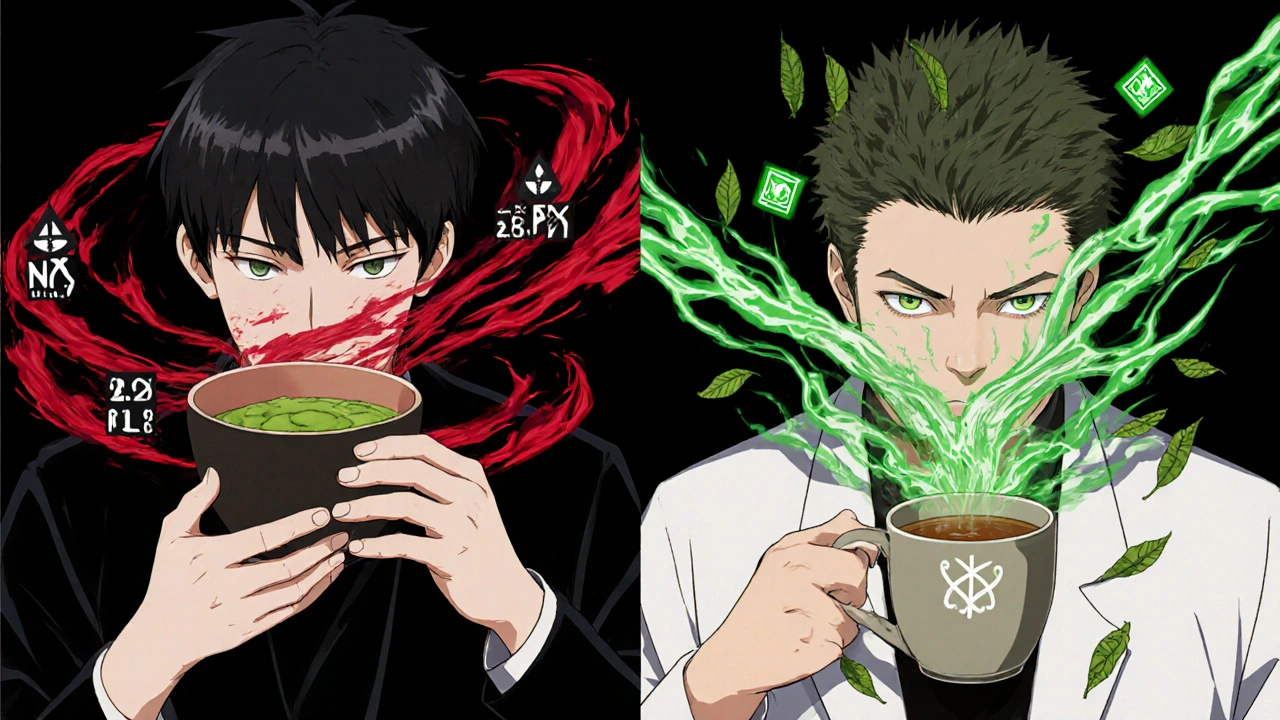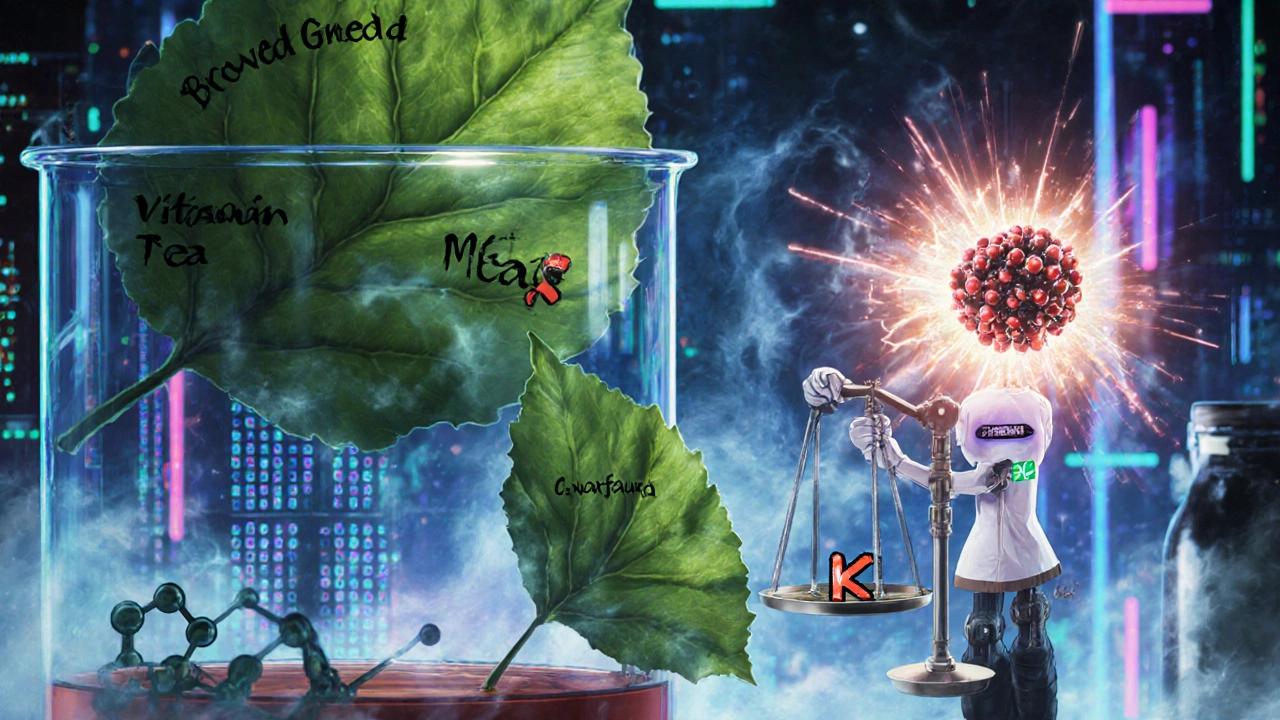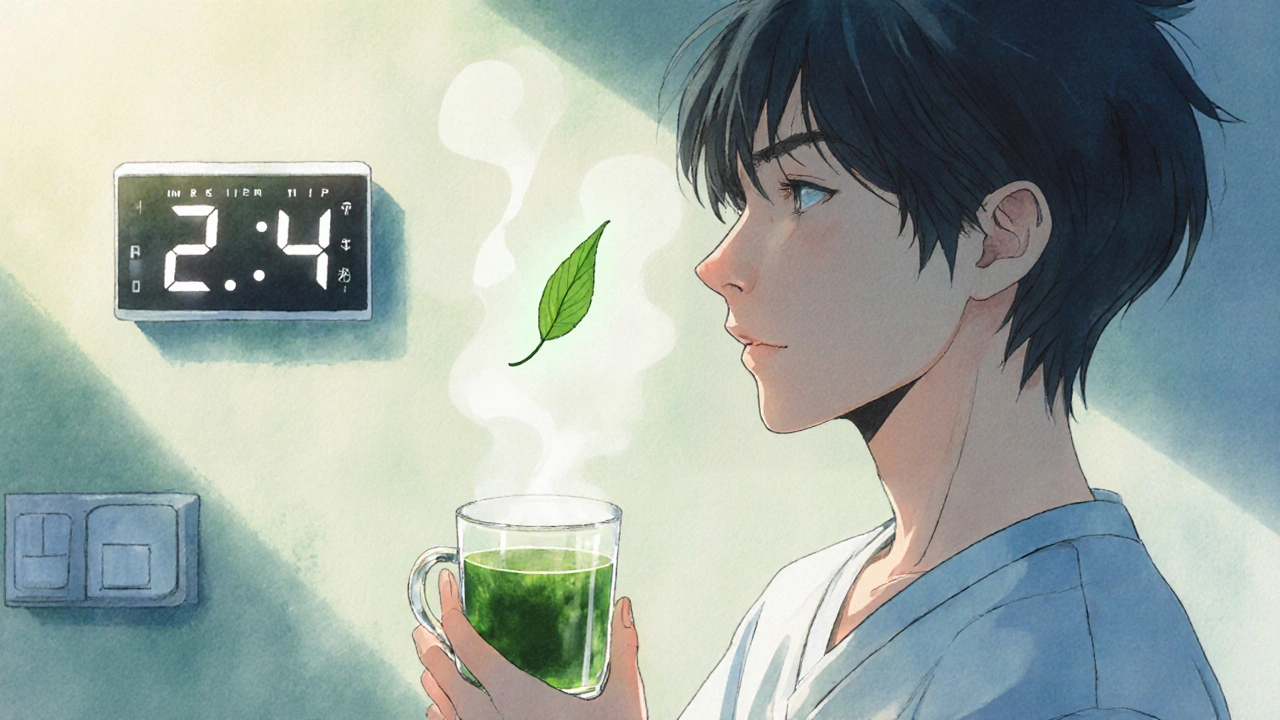Green Tea Consumption Calculator for Warfarin Users
This tool helps you determine if your green tea consumption is within safe limits while taking warfarin. Based on clinical research, most people can safely drink 1-3 cups of regular green tea daily. Matcha is significantly more potent due to the whole leaf content.
When you're on warfarin, your life becomes a balancing act. One small change in your diet can send your INR numbers spiraling - too high, and you risk dangerous bleeding; too low, and you could clot. Among the many foods and drinks that can throw off this balance, green tea is one of the most confusing. People hear conflicting things: some say it’s safe, others warn to avoid it entirely. So what’s the real story?
How Warfarin Works - And Why Vitamin K Matters
Warfarin, sold under brand names like Coumadin and Jantoven, doesn’t thin your blood like water. It works by blocking vitamin K from doing its job. Vitamin K is essential for making clotting factors - proteins your body needs to stop bleeding when you get cut. Without enough vitamin K activity, your blood takes longer to clot. That’s exactly what doctors want when you have atrial fibrillation, a mechanical heart valve, or a history of blood clots.
Your doctor checks your progress with a blood test called INR (International Normalized Ratio). A normal INR is around 1.0. For most people on warfarin, the target range is between 2.0 and 3.5. If your INR drops below 2.0, you’re not protected enough from clots. If it climbs above 4.0, you’re at risk of spontaneous bleeding - even from minor bumps.
Green Tea Contains Vitamin K - But Not as Much as You Think
Green tea comes from the Camellia sinensis plant. The leaves themselves are packed with vitamin K - about 1,428 micrograms per 100 grams of dried leaves. That’s more than spinach. But here’s the catch: you don’t eat the leaves. You steep them in hot water. And only a tiny fraction of that vitamin K makes it into your cup.
Brewed green tea contains just 0.03 micrograms of vitamin K per 100 grams. That means a standard 8-ounce cup (240 mL) has less than 0.1 microgram. Compare that to a serving of broccoli (141 mcg) or kale (483 mcg), and you see why most doctors say moderate green tea is fine.
But there’s a big exception: matcha.
Matcha isn’t brewed tea - it’s powdered whole leaves. When you drink matcha, you’re consuming the entire leaf. That means matcha has 10 to 20 times more vitamin K than regular green tea. One study found that people drinking 4 cups of matcha daily saw their INR drop from 2.8 to 1.9 in just two weeks. That’s not a fluke. That’s a direct effect.
The Paradox: Green Tea Might Also Thin Your Blood
It’s not just vitamin K. Green tea is full of catechins - natural compounds that can inhibit platelets, the blood cells that help clots form. In theory, this should make your blood thinner, which could boost warfarin’s effect. But in practice, the vitamin K effect usually wins out.
That’s why the interaction is so tricky. One study showed green tea might reduce clotting risk by blocking arachidonic acid, a key player in platelet activation. Another case report showed a man’s INR dropped from 3.79 to 1.37 after drinking half a gallon of green tea every day. The same person, if he switched to matcha, might see the same drop in just a few days.
So green tea isn’t just one thing. It’s a mix of opposing forces. For most people, the vitamin K wins. For heavy matcha drinkers, it’s a red flag.

How Much Is Too Much?
There’s no universal rule, but experts agree on clear thresholds:
- 1-3 cups per day (240-720 mL): Safe for most people. No dose changes needed. This is what the American Heart Association calls “moderate consumption.”
- 4-5 cups per day (960-1,200 mL): Possible INR drop. Monitor closely. Talk to your anticoagulation clinic.
- More than 1,000 mL (about 1 quart) per day: High risk. INR can fall quickly. You may need a warfarin dose increase.
And if you suddenly stop drinking green tea after years of daily intake? That can be just as dangerous. One woman stopped drinking black tea (similar to green tea in vitamin K content) and saw her INR jump from 1.7 to 5.0 in one week. Her body had adapted to the vitamin K from tea. When it disappeared, warfarin went unchecked - and her blood couldn’t clot properly.
What About Other Teas and Herbal Drinks?
Not all teas are the same.
- Black tea: Similar to green tea in vitamin K content. Same rules apply.
- Herbal teas (chamomile, peppermint, hibiscus): Usually low in vitamin K. But some - like ginkgo biloba or goji berry tea - can increase bleeding risk by affecting platelets. One case linked goji berry tea to major bleeding in a warfarin user.
- Cranberry juice: This one is different. It doesn’t have vitamin K. Instead, it interferes with how your liver breaks down warfarin, causing INR to rise. Avoid it entirely.
- Grapefruit: Doesn’t affect warfarin, but it’s deadly with statins. Don’t confuse the two.
Green tea’s risk is unique because it’s dose-dependent and tied to preparation. A cup of brewed tea? Fine. A daily matcha latte? That’s a conversation with your doctor.

Real People, Real Stories
Online forums are full of warfarin users sharing their experiences.
One user on Reddit, ‘ClotFreeSince2018,’ drank 4 cups of matcha daily for two weeks. His INR dropped from 2.8 to 1.9. His doctor increased his warfarin dose by 15%. He’s now stable - but he knows his limit.
Another, ‘TeaLover87,’ has drunk two cups of regular green tea every day for five years. His INR has stayed between 2.3 and 2.6. No changes. No problems.
The difference? Consistency. He didn’t switch from zero to five cups. He didn’t start matcha suddenly. He stayed the same.
A 2022 survey found that 62% of warfarin users didn’t even know green tea could affect their INR until they had a bad reading. And 38% quit tea entirely - even though they didn’t need to. That’s unnecessary fear.
What Should You Do?
Here’s your practical checklist:
- Don’t quit cold turkey. If you drink green tea regularly, don’t stop suddenly. That can spike your INR.
- Stick to 1-3 cups of brewed green tea per day. That’s safe for almost everyone.
- Avoid matcha unless your doctor says yes. Matcha is a different beast. It’s not just tea - it’s concentrated leaf powder.
- Track your intake. Write down how much you drink each day. Use an app like WarfarinWise, or just a notebook. Consistency is your best defense.
- Get your INR checked more often if you drink more than 500 mL daily. Move from monthly to biweekly tests.
- Talk to your anticoagulation clinic before making any changes. Don’t adjust your warfarin dose yourself.
The goal isn’t to eliminate green tea. It’s to keep your intake steady. Your body thrives on routine. A sudden change in vitamin K - whether from tea, spinach, or a new salad - is what throws off your INR.
What’s Next for Warfarin Users?
Newer blood thinners like apixaban and rivaroxaban don’t interact with vitamin K. That’s why many patients switch to them. But warfarin is still the best choice for mechanical heart valves, severe kidney disease, or certain clotting disorders. For those people, green tea will remain a daily consideration.
Researchers are even working on genetically modified tea plants with lower vitamin K levels. But that’s years away. For now, the answer is simple: know your tea, know your numbers, and keep your habits steady.
If you’re on warfarin and love green tea, you don’t have to give it up. Just be smart about it. One cup a day? Keep going. Four cups of matcha? That’s a red flag. Your INR doesn’t lie - and neither does your body.
Can I drink green tea while taking warfarin?
Yes, but only in moderation - 1 to 3 cups of brewed green tea per day is generally safe. Avoid matcha unless your doctor approves it, as it contains much higher levels of vitamin K. The key is consistency: don’t suddenly start or stop drinking it.
Does green tea raise or lower INR?
Green tea typically lowers INR because it contains vitamin K, which helps your blood clot. This can reduce warfarin’s effectiveness. However, in very high doses (over 1 gallon daily), the effect becomes noticeable. Matcha has a stronger impact than regular brewed tea.
How much green tea is too much on warfarin?
More than 1,000 mL (about 1 quart or 4 cups) per day is considered high risk. At this level, your INR may drop significantly. If you regularly drink this much, your doctor may recommend more frequent INR tests or a slight warfarin dose increase. Anything over 500 mL daily should be discussed with your anticoagulation team.
Is matcha tea safe with warfarin?
Matcha is not safe in large amounts. Since you consume the whole leaf, matcha has 10-20 times more vitamin K than brewed green tea. Several case reports show INR drops in people drinking just 3-4 cups of matcha daily. If you want to drink matcha, talk to your doctor first and monitor your INR closely.
What should I do if my INR drops after drinking green tea?
Don’t change your warfarin dose on your own. Contact your anticoagulation clinic or doctor immediately. They’ll check your INR and may adjust your dose or ask you to reduce your tea intake. Keep a log of how much tea you drink each day - this helps them spot patterns.
Should I stop drinking green tea if I’m on warfarin?
No, unless your doctor tells you to. Most people can safely drink 1-3 cups of brewed green tea daily. The real danger comes from inconsistency - switching between drinking a lot and then stopping. Stability matters more than elimination. Focus on keeping your intake the same every day.

Aidan McCord-Amasis
November 15, 2025 AT 20:38Matcha = vitamin K bomb. Don't be that guy drinking matcha lattes like it's oat milk. 🤦♂️
Edward Ward
November 17, 2025 AT 05:59I've been on warfarin for seven years now, and I drink about three cups of green tea daily-just regular brewed, not matcha-and my INR has stayed rock solid between 2.4 and 2.7. I think the key isn't avoidance, it's consistency. My doctor even told me that sudden changes-like quitting tea cold turkey-are more dangerous than the tea itself. I used to drink black tea, switched to green for the antioxidants, and never looked back. The body adapts. It's not magic, it's biology. Just don't go from one cup to five overnight, and don't start chugging matcha like it's kombucha. I've seen people panic over a single cup, then get their INR checked and it's fine. The real danger is fear, not the tea.
Andrew Eppich
November 18, 2025 AT 14:05It is unfortunate that medical advice has devolved into a series of casual anecdotes shared on Reddit. The fact that people treat green tea as if it were a harmless beverage, rather than a pharmacologically active substance with documented interactions, speaks to a broader cultural decline in scientific literacy. One does not casually consume vitamin K-rich substances while on anticoagulants without professional oversight. The notion that ‘moderation’ is sufficient is dangerously misleading.
Jessica Chambers
November 20, 2025 AT 13:26So… matcha is basically a vitamin K power pellet? 😳 I thought I was being healthy. Guess I’m switching to chamomile now. 🫖✨
Shyamal Spadoni
November 22, 2025 AT 08:43you ever think this whole warfarin thing is a pharma scam? they want you dependent on chemicals so you keep buying tests and pills. green tea is nature's blood thinner, they just don't want you to know. they made up the vitamin k thing to scare you. i read on a forum that the FDA banned matcha in 2019 but it's still sold everywhere because of chinese lobbying. i stopped drinking tea and now my INR is 1.2. they don't want you to be healthy. they want you to be a customer.
Ogonna Igbo
November 24, 2025 AT 04:04Why are you Americans so scared of tea? In Nigeria we drink strong black tea with sugar and milk all day and no one has a problem. Warfarin is for weak people. If your body can't handle a little tea, maybe you shouldn't be on blood thinners at all. This is why your healthcare system is broken. You turn water into a crisis. In my village, we use neem leaves and garlic for clotting. No labs. No tests. Just wisdom. You people need to stop overthinking everything.
BABA SABKA
November 25, 2025 AT 11:45Bro. Matcha is a concentrated leaf powder. That’s not tea-that’s a vitamin K supplement with a side of caffeine. If you’re sipping matcha like it’s a latte and you’re on warfarin, you’re basically doing a slow-motion suicide with a bamboo whisk. The catechins might help, but the K? Nah. That’s the dominant player here. I’ve seen INR drop 1.5 points in a week from matcha. Don’t be the guy who thinks ‘natural’ means ‘safe.’ Natural doesn’t mean ‘doesn’t interact with anticoagulants.’ It just means it’s not patented.
Chris Bryan
November 26, 2025 AT 03:15They say 'moderate' green tea is fine. But who defines moderate? Who's really monitoring this? I bet the FDA and Big Pharma are fine with you drinking tea because it keeps people from switching to the new drugs that cost $500 a month. You think they want you stable on warfarin? No. They want you on Eliquis. That’s the real agenda. Tea is a distraction. They want you confused so you don't ask why your INR keeps dropping. Don't trust the system.
ASHISH TURAN
November 27, 2025 AT 15:51I've been on warfarin since 2017. I drink one cup of green tea every morning, no more. My INR is always between 2.2 and 2.5. I don't drink matcha. I don't change my habits. I track my intake in a notebook. Simple. I don't need a PhD to understand this. Consistency > fear. If you're worried, talk to your clinic. Don't delete tea from your life because of rumors.
Ryan Airey
November 29, 2025 AT 14:32Let’s be real-this entire article is a waste of bandwidth. If you’re on warfarin and you’re asking whether green tea is safe, you shouldn’t be managing your own diet. You should be in a clinic with a nurse holding your hand. People treat anticoagulation like a yoga routine. It’s not. It’s a precision instrument. One wrong move and you bleed out. Stop reading Reddit. Talk to your hematologist. And for God’s sake, stop drinking tea like it’s a hobby.
Hollis Hollywood
November 30, 2025 AT 08:09I just want to say how much I appreciate how detailed this post is. I’ve been on warfarin for three years and I used to panic every time I had a salad or drank tea. I didn’t realize that consistency mattered more than avoidance. I started drinking one cup of green tea every day-same time, same amount-and my INR actually became more stable. My clinic even said it was a good thing because it gave them a predictable variable to work with. I used to think I had to be perfect. Turns out, I just had to be steady. Thank you for putting this out there. It helped me feel less alone.
Jonathan Dobey
December 2, 2025 AT 07:01Green tea isn't the villain-it's the mirror. It reflects our cultural delusion that we can hack biology with trendy beverages. Matcha? That’s not tea. That’s a biohacker’s nightmare wrapped in a bamboo package. You think you’re ‘wellness-ing’ yourself into longevity, but you’re just playing Russian roulette with your clotting cascade. The real tragedy? You don’t even know you’re doing it. Your body isn’t a TikTok algorithm-it doesn’t optimize for ‘aesthetic’ vitamin K intake. It just reacts. And when it reacts, it doesn’t ask for permission. It just bleeds. Or clots. Or both. Wake up. The tea isn’t the problem. The illusion of control is.